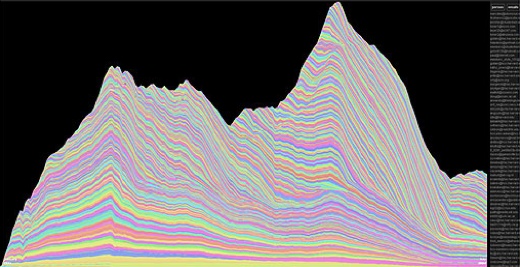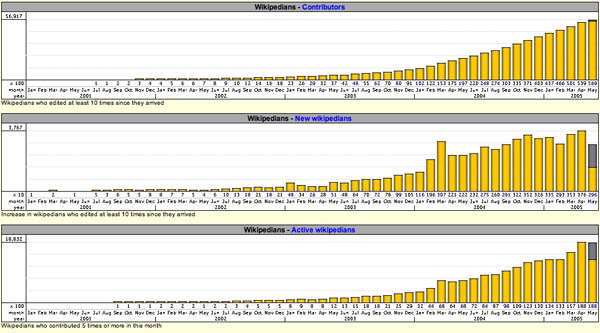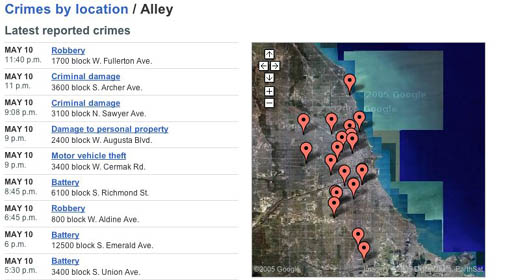Email killed the practice of letter-writing so suddenly that we haven’t a chance to think about the consequences. The Times Book Review ran an essay this weekend on the problem this poses for literary historians, biographers and archivists, who long have relied on collected letters and papers to fill in the gaps between a writer’s published work. In the same review, the Times covers a new biography of the legendary critic Edmund Wilson largely based on his correspondences, and last week covered a new collection of the letters of poet James Wright. Letters are often treated as literature in themselves.
 But a crop of writers is working now whose papers are not in order. The email is rotting away on the network, unorganized, not backed-up, and, to a great extent, simply being lost for good. I actually mused about this in a post last month about an email archive visualization tool by Fernanda Viégas at M.I.T.’s Sociable Media Group that shows years of electronic correspondence as sedimentary levels in a mountain-like mass. And a mountain it is. One novelist I know in Washington has her office stacked high with milk crates containing printouts of each and every email she sends and receives, no matter how trivial. There has to be a better way.
But a crop of writers is working now whose papers are not in order. The email is rotting away on the network, unorganized, not backed-up, and, to a great extent, simply being lost for good. I actually mused about this in a post last month about an email archive visualization tool by Fernanda Viégas at M.I.T.’s Sociable Media Group that shows years of electronic correspondence as sedimentary levels in a mountain-like mass. And a mountain it is. One novelist I know in Washington has her office stacked high with milk crates containing printouts of each and every email she sends and receives, no matter how trivial. There has to be a better way.
There isn’t necessarily anything less rich about email correspondence. It excels at capturing a vibrant volley of words with great immediacy, whereas paper letters permit deeper communiques, fewer and father between. But in some cases, these characterizations do not hold up. With reliable postal service, letters can fly back and forth quite rapidly. And just because an email suddenly appears in your box does not mean that it will be immediately read, let alone replied to. Sometimes we write long email letters, expecting that the receiver is busy and will take time to reply. These differences, true and false, are worth evaluating.
But if collected emails are to become a literary tool, there is no question that we will need more reliable ways of archiving and preserving digital correspondence. We will also need new editorial approaches for collecting and publishing them. A printed volume, or series of volumes, might be insufficient for presenting a massive 4 gigabyte email archive by Dave Eggers (No one wants to read the phone book from cover to cover). And according to the Times piece, Eggers’ agent Andrew Wylie is mulling over such a project. What would make more sense is an electronic edition that is essentially a selected or complete annotated Eggers Outbox, with folders and tags provided for categorization, a powerful search function, and the ability to organize according to your own interests. There would also be browsing and skimming tools that would allow a reader to move rapidly across vast tracts of correspondence and still find what they are looking for. And maybe, a way to email the author yourself and become a part of the living archive.
Category Archives: the_networked_book
the networked graphic novel
Media artist Andy Deck’s “Panel Junction” is a digital graphic novel that uses collaborative software to transform the authoring process. “Panel Junction” is one of the first open source networked books to visit the graphic novel genre, but judging from the response Deck is getting, it is probably not the last.
fictional pop star gets buried on wikipedia
Jamie Kane, fictional heartthrob and pop star, is the subject of a new BBC online game where players must solve the mystery of the singer’s death (story). Last Friday, a Jamie Kane article appeared on Wikipedia (original, current) that made no acknowledgement of the boy band singer’s fictional status. Encylopedians soon sniffed out the viral marketing ploy and edited the page, making it a likely candidate for deletion. Today, the BBC admitted that the page had been set up by an employee, but not as part of an official marketing campaign.
Should we be worried about the veracity of information on the web? Of course. On Wikipedia? Definitely. But not because of episodes like this. If anything, this demonstrates how Wikipedia can work quite well for pop culture, and how the community can respond swiftly to so-called vandalism. I say, let Jamie Kane have his page, just not under false pretenses. Let the page incorporate the history of this tiny scandal. That’s one of the things I find most fascinating about Wikipedia – that it can handle that kind of self-awareness.
collected letters: a mountain of email
Fernanda Viégas, a Ph.D. candidate at the Sociable Media Group at the M.I.T. Media Lab has developed an attractive visualization tool for email archives. Appropriately, she chooses the metaphor of a mountain. Colors, like rock layers, represent the various people you have kept up with. The more recent contacts are toward the peak.

It’s terrifying to think of all the email I have generated and received since I first started corresponding electronically in the mid-90s. If they were letters stuffed in shoe boxes, they would probably fill a house. Some of those shoe boxes have been vaporized (I lost a lot of my college letters (probably for the best) when my student accounts were closed. And now, probably foolishly, I use webmail, which could vanish just as easily.
A vast majority of letters are transient things, hardly worth a second look, let alone saving. But some can turn out to be valuable keys to the past – a way to unlock a mind or a relationship from an earlier time. Collected letters have always been an invaluable tool for literary and historical studies. But since letter writing is an all but dead practice, we must turn to emails for epistolary evidence. And not just email, since today’s communication practices are so diverse. Text messages, instant messenger chats, phonecalls, video conferencing – these are all avenues for our social selves. 99% may be vapor, but it would be sad to lose that salient 1% that gives flight to memory.
I came across a new program (not free) that records Skype conversations as .mp3 files. Skype is a free VoIP program (voice over internet protocol) that probably spells ultimate doom for traditional phone services. Years later, assuming your hard drive hasn’t been wiped and the file format is still readable, plug in your headphones and listen to your collected letters.
(“Mountain” via Smart Mobs via Information Aesthetics – not to be confused with, though highly related to, Information Esthetics)
wikipedia stats

From weblogg-ed (via Library Stuff):
- Over 4,000 new articles a day.
- An average of 14 edits per entry.
- About 57,000 people who have edited at least 10 times.
- About 2.7 million edits in May
It’s hard to deny that something is going on here. I wonder, though… Insofar as it assumes the mantle of the print encyclopedia, Wikipedia represents a migration of print-based knowledge to the web. Many of its most devoted contributors acquired their learning from a print world of libraries, books and periodicals. But what happens later, after this formative period, when your average user is someone who derives the bulk of their learning from the web (from resources like Wikipedia)? How do you maintain the Wikipedia article on the Spanish Golden Age when that same article is your primary source?
Perhaps Wikipedia’s encyclopedia-ness is just an early skin that it will eventually shed. It may well devolve into a sprawling compendium of trivia and eccentric niche outposts (in some ways, that’s what it already is). Or it may evolve further into that strange hybrid animal: a reference work on current events (as it has proven itself to be with the new pope and the London bombings). On the other hand, if serious scholars decide that Wikipedia is a legitimate resource worthy of investment, we might see it sustain itself as a reliable reference work (without, of course, losing all the trivia and current events). To do this, it might, paradoxically, need to stay grounded in the offline world.
convergence sightings
1: BLOGS AND RADIO. The NY Times profiles a new show on Public Radio International that draws its inspiration from the web. “Open Source from PRI” uses a public blog to cull topics and story ideas from registered commenters:
“Open Source will not be a show about blogs. It will use blogs to be a show about the world.”
Open Source offers podcasts of its programs, available for free subscription on Odeo and iTunes.
2. WIRES CROSSED. The Associated Press is preparing to launch an online video streaming network from which members can syndicate clips for presentation on their news sites. Clips will be streamed by member sites over branded video players that AP will provide. In exchange, AP will take a portion of revenues generated by interspersed video ads. Most news networks are racing to upgrade their sites to offer more video content alongside text (see “television merging with the web” on this blog).
wiki wiki: snapshot etymology

Found on Flickr: the famous “wiki wiki” shuttle bus at the Honolulu airport. In Hawaiian pidgin, “wiki wiki” means “quick,” or “informal,” and is what inspired Ward Cunningham in 1995 to name his new openly editable web document engine “wiki”, or the WikiWikiWeb.
(photo by cogdogblog)
on second thought… (wikis are hard)
The LA Times has temporarily shelved its plans for running “wikatorials” – editorials that any reader can edit – due to a flood of “inappropriate material.” The whole experiement with wikis was a risky move for a well-established newspaper to take, and it’s not surprising that they immediately panicked once the riff raff showed up. It’s hard to establish an open, collaborative environment from the top-down. Whereas, if you start from a point of low stakes, with little prestige on the line (as Wikipedia did), then the enterprise can evolve slowly, embarrassing missteps, spam and all.
Someone should start an experiment: dump the LA Times content in a non-affiliated wiki and try the wikatorials there. Give it time, let the community build, work out the hiccups, and then give the LA Times a call.
the 2005 computers and writing online conference
The Institute for the Future of the Book is presenting a paper at the 2005 Computers and Writing Online Conference. Our presentation, entitled “Sorting the Pile: Making Sense of A Networked Archive,” discusses our experience building a networked archive for our Gates Memory Project and the insights it provided regarding the evolution of books in the networked environment.
The conference began on Tuesday, May 31, and runs through Monday, June 13. It is an online conference that is open-access, Creative Commons-licensed, and hosted on a weblog. Drawing upon the conference’s theme of exploring the increasing value of the network and collaborative practices within it, presenters examine the role(s) played by social networking applications and other technologies that are intended to foster social interaction, community, and collaboration. Alongside studying the technologies themselves, presenters will observe and describe the ways that writers and users are engaging the technologies and how such engagement is changing our ideas about writing and teaching writing, and, more broadly, the concepts of rhetoric and composition themselves. We very much hope you’ll get involved by leaving your comments, or, if you prefer, respond on your own weblog and leave a trackback! Or write a response on your wiki! Or tag presentations on your del.icio.us or de.lirio.us list! You get the idea. This conference is meant to be networked.
The presentations are accessible to anyone with an internet connection, and anyone with an account at Kairosnews (registration is free) can leave comments. For more information, visit the CW Online 2005 weblog.
the city writes its book

chicagocrime.org, the best use of Google Maps I’ve seen to date, has been making the web rounds over the past week. It generates maps using information scraped from Citizen ICAM, a public portal to the Chicago Police Department’s database of reported crime. You can view by type of crime, street, date, police district, location type (i.e. alley, ATM, residence etc.), or a map of the whole city.
This is the latest in a series of living documents that have sprung up recently – web spaces tied by a thousand strings to real, physical places. I can imagine chicagocrime being integrated into a larger Chicago area web hub, or aggregator. Ideally, these hubs (see here and here) will combine the conviviality of the blog, the utility of craigslist, the diversity of Flickr or ourmedia, and the collective vigilance of citizen journalism. Other recently launched intitiatives of note are Bayosphere (“…of, by and for the Bay Area) and mnspeak.com (“twin cities: all day, all night”). The more people participate, the truer the picture of that place at that time. Are we moving past the primacy of the editor? Or will editors prove more important than ever before?
